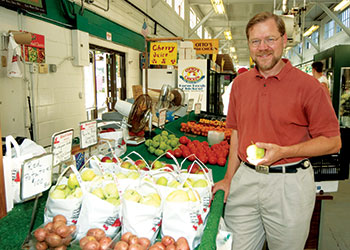Kresge Foundation Awards Grant to Visionary MSU Network
"With this renewed award, we will build on the network's unique infrastructure and collaborate with neighboring states to help them learn from our model."
January 27, 2016
Food hubs are an emerging win-win-win innovation: a business model that makes healthy local food products available to diverse markets and offers a way for small producers and value-added food businesses to succeed.
The MSU Center for Regional Food Systems (CRFS) has received a $450,000 continuation grant from the Kresge Foundation to expand the Michigan Food Hub Network, the nation’s first statewide learning community that helps food hubs become profitable while supplying healthy food to low-income communities.
“With this renewed award, we will build on the network’s unique infrastructure, which gathers food hub managers and business partners to develop strategies for business viability, reaching new markets and increasing food security in the state,” said Rich Pirog, senior associate director of CRFS. “The center will also collaborate with neighboring states to help them learn from our model.”
Over the next three years, the project will increase buyer-seller relationships and specialized assistance, emphasizing business collaborations between food hubs and food service directors of institutions (e.g. schools and hospitals).
“Institutional food service directors and buyers across the state continue to express great interest in purchasing Michigan foods, but face challenges in sourcing the foods they want at a local or regional level,” said Colleen Matts, farm to institution specialist and co-lead of the Michigan Farm to Institute Network. “Food hubs are in a position to fill that critical gap to help meet institutional demand.”
Helping small food and farm businesses
“With the network’s support I was able to attend the University of Vermont’s food hub management certificate program, participate in network meetings, and collaborate with other Michigan food hubs in an IT feasibility study,” said Rita O’Brien, associate director of Lansing’s Allen Market Place. “These experiences helped us to develop a stronger business model which has set our hub on a path of success.”
Throughout Michigan, representatives gather three times per year to build peer relationships and share lessons learned. The network also collaborates to address regional food value chain challenges.
For Natasha Lantz, co-lead of the Upper Peninsula Food Exchange, these partnerships have been important. “The Michigan food hub network has been invaluable in helping us establish, develop, and continue to grow our food hub. The statewide meetings allow us to share resources, get new ideas and set the groundwork to coordinate efforts. The network takes our needs seriously and works with us to obtain resources and find solutions to common challenges. This is evidenced by attention to both farm food safety and food hub technology, two issues that are proving to be challenges to food hubs in our state.”
Expanding the network – need and opportunities
Michigan’s food hubs are well positioned to expand connections between the state’s producers and markets. Over 1.8 million Michigan residents, including an estimated 300,000 children, live in low-income communities with limited supermarket access.
“We have seen too much emphasis on getting local food into the untransparent large distribution system rather than doing the work to build a side-by-side local system that is traceable and trustable,” said a participant at a network meeting.
Eighty-two percent of Michigan school food service directors reported interest in purchasing local foods in a 2013 survey. Their top logistical challenges were lack of labor to prepare local foods, lack of storage and lack of a distribution method to get local foods to their programs. Working together to turn these challenges into opportunities is the Michigan Food Hub Network’s philosophy. “Strong, collaborative relationships are key to the success of any business; building such relationships across hubs and their business partners is what the Michigan Food Hub Network does best,” said Pirog.
Kresge Foundation is a $3.5 billion private, national foundation that works to expand opportunities in America’s cities through investing in arts and culture, education, environment, health, human services, and community development.




